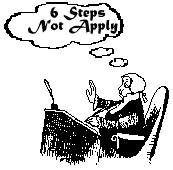TIPS
on Parliamentary
Procedure
According to
Robert's
RULES OF
ORDER

 When Six Steps Do Not Apply
When Six Steps Do Not Apply
- Speaker stands, is recognized, and makes a motion.
- Motion is seconded.
- Presiding Officer restates the motion to the audience.
- The assembly debates the motion.
- The vote is taken.
- The chair announces whether the motion was adopted or not; instructs the correct officer to take action.
- Privileged Motions do not relate to the pending motion, but are of such immediate importance that they take precedence over any Main Motion.
- Question of Privilege: As a member of the audience you believe that you can not hear or see the proceedings, but you have a feasible solution. You have the right to stop the meeting, and have the problem corrected.
- Call for the Orders of the Day: You notice that the agenda specifies the time for each portion of the agenda. You notice that the part you are interested in is scheduled for 9:15 am, and the time is now 9:16 am. The meeting is stuck with the 9:05 am item. You 'Call for the Orders of the Day'. This automatically forces everyone to abandon the 9:05 item and deal with 9:15 item.
- Incidental Motions do not relate directly to the substance of the pending motion, but rather to the method of transacting the business of the motion. Incidental motions must be dealt with immediately.
- Point of Order: During a meeting you notice that someone (even the presiding officer) is disobeying Robert's Rules of Order. You state 'Point of Order' and explain your point. The Presiding Officer rules on your point and you help to keep everyone in line.
- Point of Information:
One right no one can take from you is the right to understand the process and the potential consequences of the next voting. You have the right to stop business and have someone explain the process and consequences of the debate or the voting. Your request for information can not be ignored by the Presiding Officer.- Division of Assembly:
Whenever you doubt the Presiding Officer's hearing capabilities during a vote by loud ayes/nays, you can have the vote taken by having voters stand instead of yelling. You call for a 'Division of the Assembly' and the vote has to be retaken in a more accurate manner. - Object to Consideration: Sometimes a sensitive or embarrassing motion is made. You can kill it before it is discussed by getting 2/3 of the assembly to agree with you to kill the motion before it is discussed.
In both cases, you do not need to be recognized, or seconded. No one can amend or debate your motion! No vote is necessary. You can get your way without going through the 6 steps.
In the last 3 cases, you do not need to be recognized, or seconded. No one can amend or debate your motion! No vote is necessary. You can get your way without going through the 6 steps.
In this case, you do not need to be recognized, or seconded. No one can amend or debate your motion! A 2/3 vote is necessary. You can get your way without going through the 6 steps.
If you know when the 6 steps do not applied, you can protect your rights as a member of an organization. Otherwise, somebody will undoubtedly and easily rob you of your rights.
parilam@roberts-rules.com a member of
National Association of Parliamentarians and
American Institute of Parliamentarians Created by Cuesta Web Designs; Sacramento, California